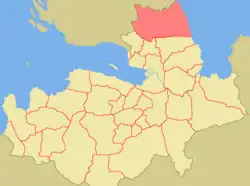North Ingria
The Republic of North Ingria (Finnish: Pohjois-Inkerin tasavalta; Ingrian: Pohja-inkeriläin respublikka) or Republic of Kirjasalo (Finnish: Kirjasalon tasavalta, Ingrian: Kirjsalon respublikka) was a short-lived, small state for the Ingrian Finns in the southern part of the Karelian Isthmus, which seceded from Bolshevist Russia after the October Revolution. Its aim by most proponents was to ultimately be incorporated into the Kingdom of Finland, and it ruled parts of Northern Ingria from 1919 until 1920. With the Peace Treaty of Tartu, it was re-integrated into Russia; however, Ingrian Finns of this area enjoyed a certain degree of national autonomy until the 1930s in compliance with the policy of national delimitation in the Soviet Union. In 1928 the Kuivaisi National District was established there with its administrative base in Toksovo. In 1939 it was abolished and the area was joined to the Pargolovo district.[1] Today, it is the north-eastern part of Vsevolozhsky District.
| Start day | Start month | Start year | End day | End month | End year | Chair |
|---|---|---|---|---|---|---|
| 9 | July | 1919 | September | 1919 | Santeri Termonen | |
| 14 | September | November | Juho Pekka Kokko | |||
| 16 | November | May | 1920 | Georg Elfvengren | ||
| June | 1920 | 5 | December | Jukka Tirranen |
Republic of North Ingria Pohjois-Inkerin tasavalta | |||||||||
|---|---|---|---|---|---|---|---|---|---|
| 1919–1920 | |||||||||
 Flag
 Coat of arms
| |||||||||
| Anthem: Nouse, Inkeri | |||||||||
 | |||||||||
| Capital | Kirjasalo | ||||||||
| Government | Republic | ||||||||
| Legislature | Governing council | ||||||||
| History | |||||||||
• Established | 9 June 1919 | ||||||||
• Disestablished | 5 December 1920 | ||||||||
| Currency | Finnish Mark | ||||||||
| |||||||||
Population not including soldiers | |||||||||
See also
References
- Kurs, Ott (1994). Ingria: The broken landbridge between Estonia and Finland. GeoJournal 33.1, 107-113.
External links
- Ingria on Fire: A little-known episode of the White Movement (in Russian), including a map of Finnish toponyms.